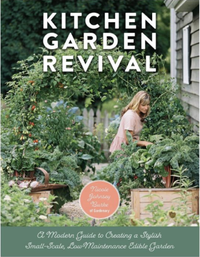See: Kitchen garden ideas – easy ways to get started Here, Nicole, who has just released a new book, Kitchen Garden Revival (opens in new tab), gives us the benefit of her experience on what not to do – and how to plan well so that, come harvest-time, we are rewarded for our efforts.
1. Not integrating your kitchen garden design
‘Take some time to assess your own home style and specific spots in your landscape or yard that might have elements you can tie into your kitchen garden design. I love to design kitchen gardens that look like they’ve always been there so taking time to link your garden to a line of bushes, the boundary line of the patio or deck, or the edge of your home can make it feel like part of your space and a beautiful addition to your existing home and yard. ‘Make the garden look like it’s always been there and before long, you’ll feel like that’s actually the case.’ See: Planning a kitchen garden – from designing a layout to picking plants
2. Hiding your kitchen garden away
‘Consider your common traffic patterns before designing and setting up your kitchen garden. Many clients and students have the impulse to place the garden out of sight behind a garage or at the back of their property because they’re afraid of its unkempt nature. ‘But hiding the garden away from sight is almost a guarantee that the plants will indeed become unkempt. When you place the kitchen garden alongside your. common patterns of traffic in your home and landscape, you’re ensuring you’ll go there more frequently to water, tend and best of all-harvest a little for tonight’s dinner. ‘Make the kitchen garden a focal point in your home and you’ll soon find the garden becomes a central part of your life as well.’
3. Not investing in good quality raised beds
‘Do the worst part first. “Worst first” is a tip I tell all my students and clients when they’re about to set up their kitchen garden. Oftentimes, we’re eager to skip to the plants and so we end up buying a cheaply made raised bed, not taking time to clear and set up the space before installing or just dig some holes and plant those plants already. ‘But when we do the worst part, the hardest part, of the garden installation first, we save ourselves the headache and frustration that rushing to plant causes. When you take time to properly clear your space, level it, and cover it before installing your raised beds and soil, you’ve done all the heavy lifting up front and all that lies ahead is enjoying the growth and harvests-not trying to undo mistakes or make up for steps you skipped.’
4. Not planting enough
‘Use my intensive planting method. A huge mistake I see new gardeners make, or even seasoned gardeners, is not planting enough plants. Most instructors tell students to start with just a few plants but I suggest the opposite. ‘Too few plants means that more soil in your garden will be exposed which also means you’ll need to do more weeding and watering. Plus, fewer plants means your garden is actually less interesting and thus less attractive for you to head out and tend and care for it. ‘On the other hand, I tell my clients and students to “think about nature” and plant the garden the way nature plants itself – lots of plants growing together closely in one space. Doing this means less weeding and watering and also much more interest and excitement each day as there’s almost always something to tend, plant or harvest.’ See: Companion planting – your ultimate guide to planting alongside fruit and veg
5. Not getting expert help
‘Get expert help! I see most beginner gardeners try to do it themselves when they get started only to feel frustrated and overwhelmed and then swear they just don’t “have a green thumb”. ‘But gardening is just like any skill – it’s learned through methods, understanding, and experience. So, just like it’s great to have a coach teach you how to play tennis or start a yoga practice, it’s super smart to have an experienced garden consultant help you learn the skill of gardening. ‘Gardenary has Garden Consultants around the country that can help along with books and online courses that can support you along your journey. Take my advice and “Never garden alone”. Get help and encouragement and you’ll find yourself calling your self a gardener too very soon.’ Author Nicole Johnsey Burke, founder of Rooted Garden, one of the leading US culinary landscape companies, and Gardenary, an online kitchen gardening education and resource company, leads the way with expert advice.
